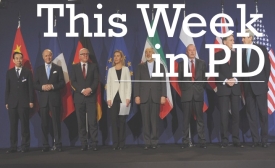iran
After triumphs abroad, President Barack Obama is finding stern challenges at home to his foreign policy breakthroughs, facing hard sells to skeptics over U.S. shifts, first on Iran and now Cuba. Obama returned to Washington early Sunday still basking in the attention from his historic meeting with Cuban President Raul Castro at a summit of Western Hemisphere leaders. But Obama is certain to find a lessappreciative crowd in Congress than the one he left behind at the Summit of the Americas in Panama.
Engaging with hostile governments while meeting core strategic needs would better serve American interests than unending sanctions and isolation, the president argues. The administration’s policies reflect his confidence in diplomacy and his trust that openly engaging with other nations will be effective.
Just a week after agreeing on a framework for a nuclear deal, Iran’s supreme leader and the Obama administration clashed over its core elements, rekindling doubts about whether Washington and Tehran can finalize an accord by a June 30 deadline. The supreme leader, Ayatollah Ali Khamenei, in his first public comments on the diplomacy, said on Thursday the U.S. and its negotiating partners must lift all sanctions on his country immediately upon a final deal being signed.
Washington’s long-awaited nuclear deal with Iran prompted relief in Tehran over an end to international isolation, anxiety among Middle Eastern allies over the United States’ “Persian pivot,” and skepticism in the U.S. Congress, given Iran’s long-standing sponsorship of terrorism. The framework agreement will also have wider repercussions — for Asia.

Will the Iran nuclear framework shape future international relations? This week PD News takes a look at the reactions to what may be an historic agreement.
For years, the United States and other nations have reached out to this population through broadcasting and online venues, but this process should be immediately expanded. Exchange programs – academic and cultural – are effective in breaking down stereotypes, and existing efforts should be accelerated.

Philip Seib on engaging with Iran.
Whatever happened to real cultural diplomacy with Iran? In April 1976, as part of a celebration of the bicentennial of America, I was officially invited to Tehran along with several other runway fashion models to present the collections of 16 of America's top designers.







